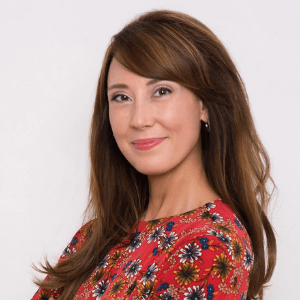Meet Raquel Jex Forsgren. She started her career as a nuclear scientist and then immersed herself in pharmaceutical drug development, because cancer touched her great grandfather, grandmother and a close friend. She saw the effects of the disease first hand and decided to pursue drug development for a more direct impact on cancer patients. While working in pharmaceuticals, Forsgren branched out to pursue yoga as a complementary healing strategy for cancer patients.
“Yoga had helped me be a better, more courageous and resilient leader,” recalls Forgren. “I was convinced this was the next area of expertise I needed to build.”
 Yoga therapy is an integrative approach that helps to optimize treatments that an oncologist has prescribed for the person with cancer, including people living with brain tumors and those who care for them. Evidence shows that yoga therapy can support the body: physically, emotionally and spiritually.
Yoga therapy is an integrative approach that helps to optimize treatments that an oncologist has prescribed for the person with cancer, including people living with brain tumors and those who care for them. Evidence shows that yoga therapy can support the body: physically, emotionally and spiritually.
“Yoga therapy is quite distinct from that taught in yoga studios or portrayed in the mainstream media,” said Forsgren.
Benefits of Yoga Therapy
Research has also shown that boosting the immune system and balancing the nervous system can help the body fight disease and heal. Maintaining strength and balance in the body is also key to improving quality of life, particularly for those with brain tumors. These studies, which are included in the oncology treatment guidelines for clinicians and nurses, support the role of yoga to help manage physical side effects, such as lymphedema (swelling in parts of the body), bowel changes and pain. Yoga therapy can also help manage body image challenges, depression, anxiety, fear, anger or grief.
Tools in Yoga Therapy
There are a variety of tools in yoga therapy to help people with brain tumors, including postures and movements tailored to the ability of the person and their unique needs. Additional strategies include imagery, deep relaxations, journaling, affirmations, and, most importantly, leveraging breathing to control the mind and relax the body.
“A myth about yoga therapy, is that it needs to be practiced in a studio, when the reality is it can be practiced in any setting,” said Forsgren. “We work together to build strength, improve balance if patients are a fall risk, relax their nervous system, and boost their immune systems – all from the home or the hospital bed. We also almost always spend time on the emotional and mental aspects of their journey.”
Yoga Therapy Tailored for the Patient and Caregiver
Forsgren also works with caregivers and says they need as much support as the person they are caring for, as they may experience the same emotions and stress as their loved one diagnosed with a brain tumor. Forsgren notes that caregivers may also benefit from a supported immune system, rebalanced nervous system and a way to reconnect with themselves through the help of yoga therapy.
 “Yoga therapy benefits all individuals uniquely, and the beauty of working with a yoga therapist is that each session is tailored to the person,” shares Forsgren. “The type of brain tumor, the stage, the treatments being used, the emotional and physical journey are all taken into consideration at the initial meeting and along the journey of working together.”
“Yoga therapy benefits all individuals uniquely, and the beauty of working with a yoga therapist is that each session is tailored to the person,” shares Forsgren. “The type of brain tumor, the stage, the treatments being used, the emotional and physical journey are all taken into consideration at the initial meeting and along the journey of working together.”
Yoga Therapy at the ABTA 2019 National Conference
Raquel Jex Forsgren is the founder of Front-Line Resilience Health and Living Yoga Therapy. She is a healthcare consultant, Certified Resilience Coach and Certified Yoga Therapist. ABTA is pleased to have Forsgren present the sunrise yoga therapy sessions at the ABTA 2019 National Conference Friday and Saturday, Sept 6.and 7.
To learn more or register for the National Conference, visit the ABTA website.
